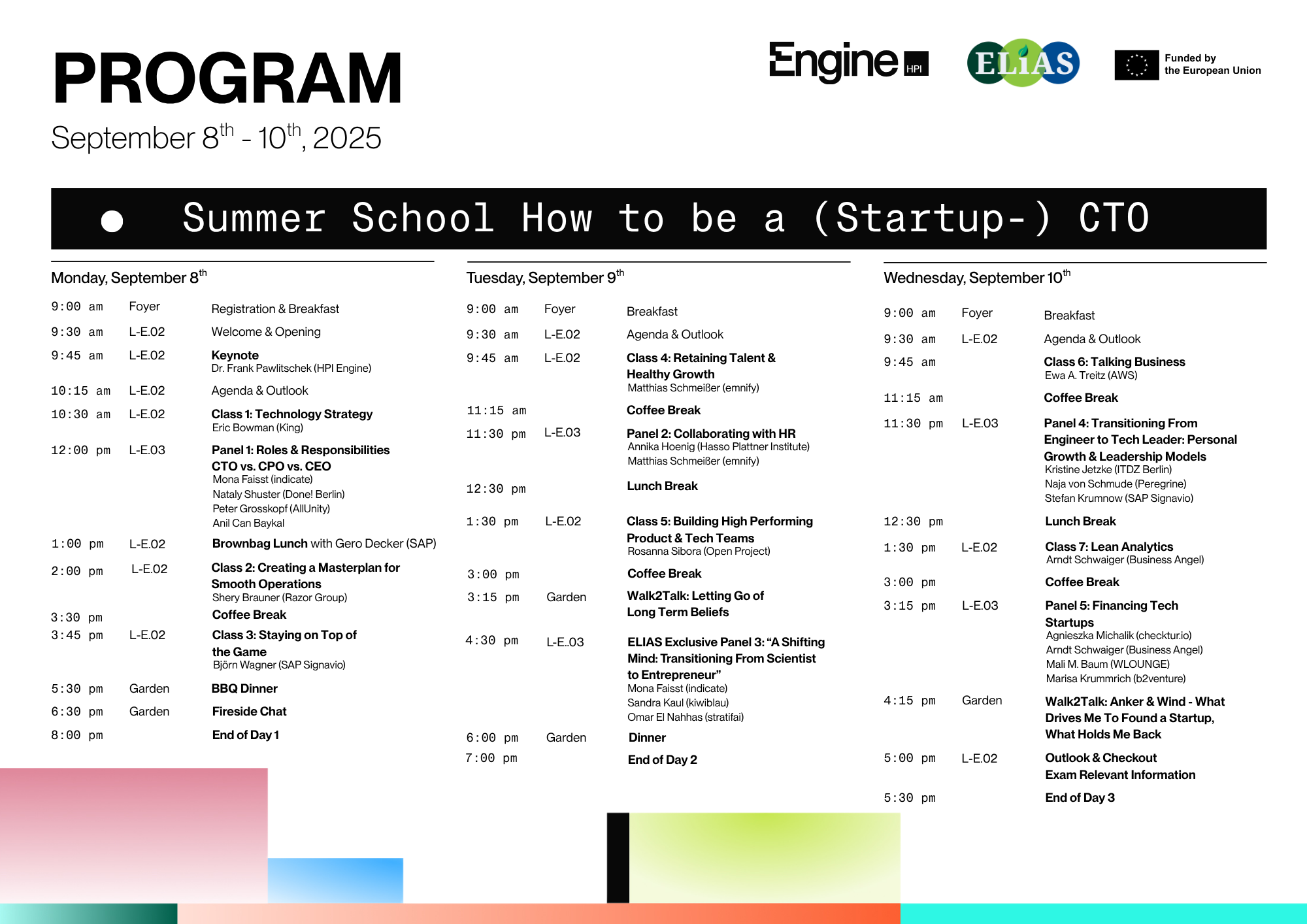
Benefits
■ 01
■ 02
■ 03
■ 04
■ 05
■ 06
■ 07
■ 08
■ 09
■ 10
■ 11
■ 12
Insights Into The Role of a CTO
Attention
The Summer School “How to Be a (Startup) CTO” is an intensive 3-day seminar for master’s students and PHD candidates who want to explore the full role of a Chief Technology Officer in a startup or tech company. Gain a 360° perspective on the technical, strategic, and leadership challenges of modern CTOs.
Term(s)
Summer School 2026 (program running annually)
Time investment
Corresponds to 2 semester hours per week
ECTS
3
Module type
Wahlpflichtmodul
Module selection at HPI
(preliminary)
ITSE: HPI-MK, HPI-SSK-RW, HPI-SSK-ML
DE: HPI-SSK-RW, HPI-DE-RWM, HPI-PSK-ML
CS: HPI-DE-RWM, HPI-PSK-ML
DH: HPI-PSK-MLE
SSE: HPI-PSK-ML, HPI-PSK-EI
Grades
Yes
Enrollment deadline
tbd for 2026
Examination date
tbd for 2026 / §9 (4) BAMA-O (8 days rule)
Teaching format
Seminar
Teaching language
Englisch
Registration requirements and link
Fee
None
Team budget
HPI Founder Scholarship
Participants
Maximum number of Participants
Room (Location)
Key dates
tbd for 2026
Will be announced soon
Learning and Teaching Methods
The lecture covers three different aspects:
The Summer School “How to Be a (Startup) CTO” at HPI in Potsdam Griebnitzsee, close to Berlin, is an intensive 3-day seminar designed for master’s students and PhD candidates seeking to understand the multifaceted role of a Chief Technology Officer in startup and tech environments.
Participants will learn about specific tasks and responsibilities of a CTO such as technology strategy, devops, leadership, building high performing teams, retaining talent, healthy growth, communication, lean analytics and financing tech startups.
The summer school consist of a blend of classes, panels, fireside chats and reflection sessions to not only gain knowledge but also to engage actively with expert speakers and other participants as well as reflecting on their own career path.

■ 01
■ 02
■ 03
■ 04
■ 05
■ 06
■ 07
■ 08
■ 09
■ 10
■ 11
■ 12

Week 1
Day 1
Week 2
Day 2
Week 3
Day 3
Week 4
Day 4
Week 5
Day 5
Week 6
Day 6
Week 7
Day 7
Week 8
Day 8
Week 9
Day 9
Week 10
Day 10
Week 11
Day 11
Week 12
Day 12
Week 13
Day 13
Week 14
Day 14
Week 15
Day 15
Week 16
Day 16
Week 17
Day 17
Week 18
Day 18
Week 19
Day 19
Week 20
Day 20
Week 1
Day 1
Week 2
Day 2
Week 3
Day 3
Week 4
Day 4
Week 5
Day 5
Week 6
Day 6
Week 7
Day 7
Week 8
Day 8
Week 9
Day 9
Week 10
Day 10
Week 11
Day 11
Week 12
Day 12
Week 13
Day 13
Week 14
Day 14
Week 15
Day 15
Week 16
Day 16
Week 17
Day 17
Week 18
Day 18
Week 19
Day 19
Week 20
Day 20
The course ends with an (non-multiple-choice!) examination covering all topics mentioned above, compiled by the speakers and curated by HPI. In the questions, certain scenarios will be laid out and the student needs to describe how to handle the situation.

Anna Schnekker
Program Manager
Requirements
Program Structure
Data Rights
While we will keep all information within our support team, we cannot guarantee complete confidentiality of information leaking to the outside world.
We do not anticipate any intellectual property created as a direct result of our program. Furthermore, HPI does not consider use of office space and infrastructure as constituting a significant use of HPI resources with regards to IP.
We offer few places for non-HPI students in this program. If you are interested please text us at e-school-program(at)hpi.de
Your application should include: